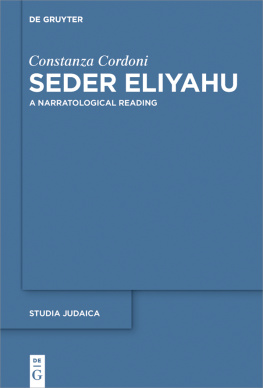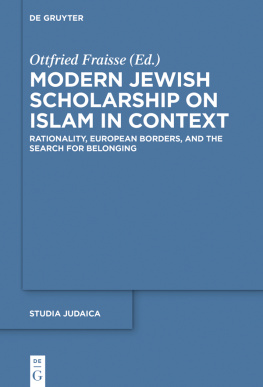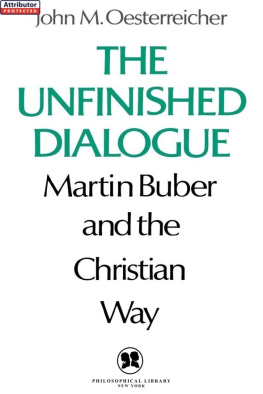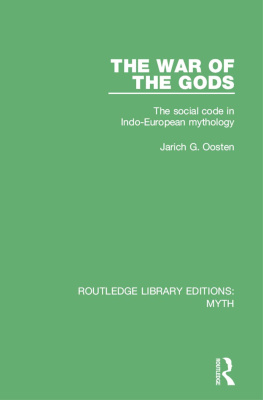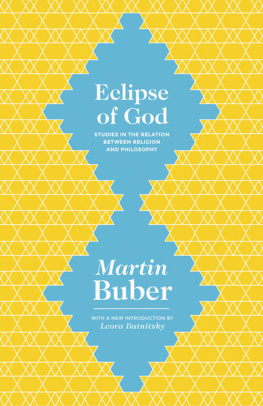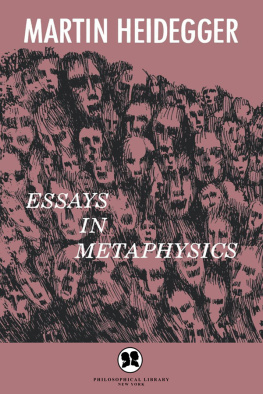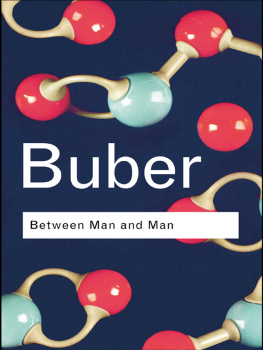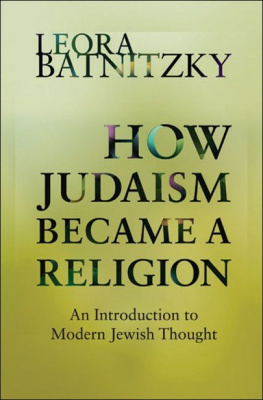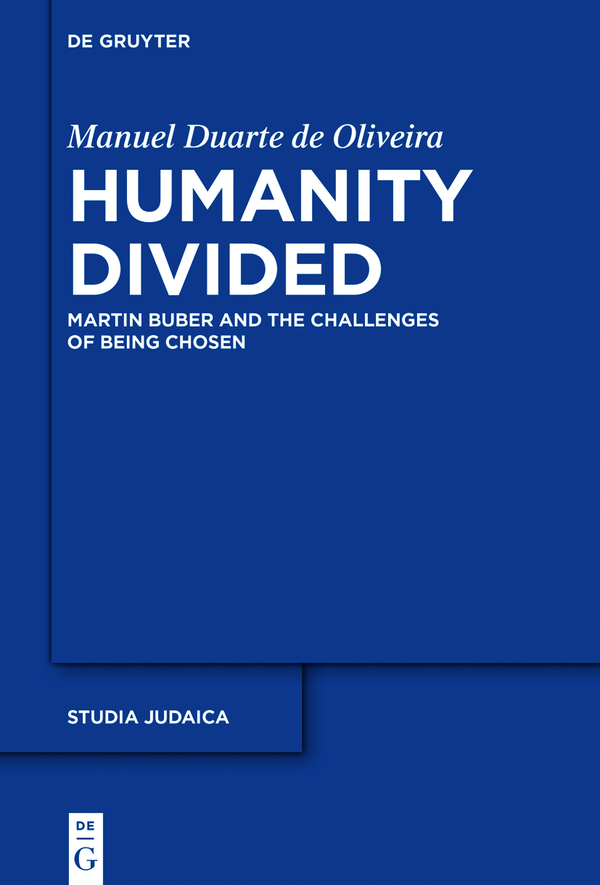Studia Judaica
Forschungen zur Wissenschaft des Judentums
Edited by
Ernst L. Ehrlich
Gnter Stemberger
Charlotte Fonrobert
Elisabeth Hollender
Alexander Samely
Irene Zwiep
Volume
ISBN 9783110740745
e-ISBN (PDF) 9783110741087
e-ISBN (EPUB) 9783110741186
Bibliographic information published by the Deutsche Nationalbibliothek
The Deutsche Nationalbibliothek lists this publication in the Deutsche Nationalbibliografie; detailed bibliographic data are available on the Internet at http://dnb.dnb.de.
2021 Walter de Gruyter GmbH, Berlin/Boston
Zitate
Ah, those who add house to house and join field to field,
Till there is room for none but you to dwell in the land!
Isaiah 5, 8
Your modesty is a function of your powerlessness; when you have power, you will be as cruel as any other people.
Judah Halevi
I have nothing to add to what already appeared in the Scriptures, the same Scriptures to which the national religious fools appeal for support of their lust for conquest.
Yeshayahu Leibowitz
[T]he Jewish people early became conscious of its superiority to its neighbours. () In the manner of those times, this consciousness found expression in the religious idea that God had chosen Israel to make him high above all the nations (). There was no thought of the advantage or disadvantage of the rest of mankind; the sole object was the existence of the superior type.
Ahad Ha-Am
Jewish Messianism in its origins and by its nature this cannot be sufficiently emphasized is a theory of catastrophe. This theory stresses the revolutionary, cataclysmic element in the transition from every historical present to the Messianic future.
Gershom Scholem
Utopian but resolutely anti-apocalyptic, [Martin] Bubers Zionism was not political Zionism, but Zionism devoted to the life of the spirit, and, drawing on the Hasidic tradition, to the sanctification of everyday life.
Jacqueline Rose
They could no longer surrender to the temptation to conquer Space, since they had been conquered by Time, which they now wished to inhabit to their last extent.
Acknowledgements
Your absence moved me to compose this Treatise, which I have composed for you and for those like you, however few they are.
Moses Maimonides
My encounter with Judaism was never merely an intellectual endeavor, but rather a deeply existential and spiritual one. During my studies at the Hebrew University and the Hartman Institute, I was fortunate to meet wonderful people who unfailingly accompanied me along my journey with love and care, expressing a unique and most precious way of affirming the sacredness and most profound recognition of the value of life. Many of them were involved in the path that led me through the process of discovery of this amazing tradition and unique civilization. It would be difficult to name them all, but at least a few immediately come to mind. First of all, I would like to acknowledge the unremitting friendship and unrelenting support of Paul Mendes-Flohr, a light shining high in the field of modern Jewish scholarship, and a beacon of humanness. Then, I would like to acknowledge the name of other masters that introduced me to the study of Jewish Thought: Zeev Harvey, Shalom Rosenberg, Eliezer Schweid, Rachel Elior, Benjamin Ish-Shalom, Avi Ravitzky, Moshe Idel, Daniel Schwartz, and so many others. But, a very special acknowledgement should go to my closest friends, that along the way accompanied me during the incredibly years of intense study in Jerusalem, filling the gaps that scholarship alone could not sustain: Eli Kalmanzon, Avinoam Rosenak, Shmuel Herr, Shlomo Naeh, Zvi Zohar, Yehuda Brandes, Yehuda Cohen, Michael Kagan, Itzik Benbaji, Yosi Vazana, and their dear families; and to so many others whose friendship is unforgettable, but whose names sometimes start to be difficult to remember, although their soul left an indelible mark to this day.
There is an exceptional group of friends that have since passed away, but whose memory, fracefulness, and wisdom will shine into Eternity: Marcel Dubois, Bruno Hussar, Yeshayahu Leibowitz, David Hartman, Pesach Schindler, Yoram Ben-Porat, Saul Cohen, David Trager, Isadore Twersky, Hilary Putman, and, in a very special way, Nira Trumper-Hecht and Michael Tauber, who so prematurely left us, and to whom this work is dedicated. A word of thanks and indebtedness also to my friends in the larger world: Aslaug Kristiansen, Rachel McDermott, Lus Giron, Stphan Weiss, Arthur Jacobson, George Fletcher, Elliot Wolfson, Ben Hecht, Emanuel Fiano, Jos de Sousa e Brito, Jos Lus Seruya, Joo Pimentel, Antnio Ataz, David Sampson, and so many others who have left an indelible trace of light and wisdom. And to my Students, and my Colleagues at Berkeley and Stanford: Martin Jay, Daniel Boyarin, Ron Hendel, Chana Kronfeld, Joshua Cohen, John Kieschnick, Charlotte Fonrobert, Michael Penn, and Steven Zipperstein. Finally, a very special word of heartfelt gratitude goes to my beloved Family!
Foreword
I do not know of anyone else who is as honest as he [Martin Buber] is with respect to spiritual and intellectual matters, and as dependable in human affairs.
Franz Rosenzweig
With exacting scholarship and fecund analysis, Manuel Duarte de Oliveira probes through the lens of Martin Buber the theological and political ambiguities of Israels divine election. These ambiguities became especially pronounced with the emergence of Zionism. Wary, indeed, alarmed by the tendency of some of his fellow Zionists to conflate divine chosenness with nationalism, Buber sought to secure the theological significance of election by both steering Zionism from hypertrophic nationalism and by a sustained program to revalorize what he called alternately Hebrew Humanism and Biblical Humanism, as he entitled two of his most seminal essays on the spiritual and cultural renewal of Judaism.
In these and allied essays, as Oliveira deftly demonstrates, Buber viewed the idea of election teleologically, espousing a universal mission of Israel, which effectively calls upon Zionism to align its political and cultural project to universal objectives. Thus, in addressing a Zionist congress, he rhetorically asked, What then is this spirit of Israel of which you are speaking? It is the spirit of fulfillment. Fulfillment of what? Fulfillment of the simple truth that man has been created for a purpose () Our purpose is the upbuilding of peace () And that is its spirit, the spirit of Israel () the people of Israel was charged to lead the way to righteousness and justice. In elucidating the presuppositions of Bubers ramified writings on the challenge of chosenness, Oliveira provides the reader with the conceptual leverage to confront with refined theological and ethical sensibilities what the former Chief Rabbi of Great Britain, Jonathan Sacks has aptly called, Chosenness and its Discontents.
Paul Mendes-Flohr
Dorothy Grant Maclear emeritus Professor of Modern Jewish History and Thought
The University of Chicago
Professor emeritus, The Hebrew University of Jerusalem
Preface
In order to stimulate new thinking, it is necessary to undermine the myths that have determined structures of thinking. Some of my findings may cause storms of controversy. But they may also serve as a catalyst in evolving new positions and alternate solutions.
Simha Flapan
I have decided not to postpone what I have to say. A consciousness of my responsibility urges me to speak before the confusion increases. What I am going to deal with is the unambiguous demarcation of a kind, a degenerate kind of nationalism, which of late has begun to spread even in Judaism.


